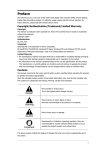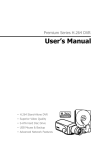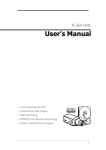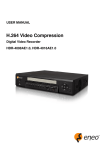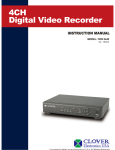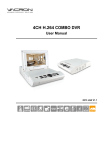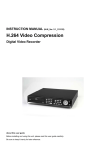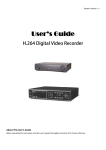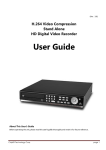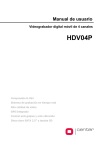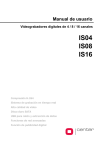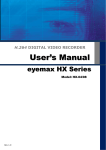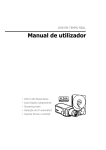Download Version : 10.11.03 User`s Manual
Transcript
Premium Series H.264 DVR User’s Manual (Model: HDF1212DV, HDF1212H, HDE2424DV, HDE2424H, HDS4848DV, HDS4848H) ▪ H.264 Stand-Alone DVR ▪ Superior Video Quality ▪ S-ATA Hard Disc Drive ▪ USB Mouse & Backup ▪ Advanced Network Features Version : 10.11.03 1 Preface We welcome you as a new user of the world's best digital video recorder (DVR), and the leading Digital Video Surveillance System. For effective usage, please read this manual carefully. For future reference, please keep this manual close to hand. Copyright/Authentication/Trademark/Limited Warranty Copyright This manual is produced under copyright law. None of its contents may be copied or duplicated without prior approval. Copyright 2009~ Authentication CE, FCC, KCC Trademark Ethernet(TM) is the trademark of Xerox Corporation. Microsoft(TM), MS-DOS(TM), Windows(TM logo), Windows(TM) and Windows NT(TM) are the trademarks of Microsoft Corporation, used in the United States and elsewhere. Limited Warranty • The manufacturer, importer and agent shall not be responsible for accidental damage (including injury) and other damage caused by inappropriate use or operation of this product. • The information in this manual is prepared based on the current specifications for the product. The manufacturer is currently adding new functions and will continue to upgrade the product with new technology. All specifications may be changed without notice to individual users. Cautions We strongly recommend that users read all safety cautions carefully before operating the product, to operate the product appropriately. Since the indicated cautions contain critical safety information, they must be fully complied with. The cautions are categorized into Danger, Warning, Caution and Important. Risk of death or serious injury. This is the highest priority danger warning. Risk of serious or lesser degree of injury. May also cause damage to the product or to property. Risk of minor injury or damage. Requirements or limitations regarding operation. Users are recommended to read the relevant details carefully so as to operate the product properly and without harm. The above cautions indicate the degree of damage that may occur due to inappropriate use of the system. 2 Risk of death or serious injury. This is the highest priority danger warning. • RISK OF EXPLOSION IF BATTERY IS REPLACED BY INCORRECT TYPE. DISPOSE OF USED BATTERY ACCORDING TO THE INSTRCTIONS. • THIS EQUIPMENT IS INDOOR USE AND ALL THE COMMUNICATION WIRINGS ARE LIMITED TO INSIDE OF THE BUILDING. • Please connect the power cord only to the type of AC outlet indicated in the manual or product specification. If connected to other types of power outlet, fire and electric shock may result. • Do not expose the product to moisture and dampness. Doing so may result in fire and electric shock. • Do not place heavy objects on top of the power cord. Damage to the power cord may result in fire and electric shock. • Do not place containers with liquid or small metal objects on top of the product. Liquid or small metal objects getting into the unit may lead to fire and electric shock. • Do not score, bend, twist, pull or heat the power cord. Damage to the power cord may lead to fire and electric shock. • Do not remove the top casing of the product. Doing so may result in electric shock. If internal examination and maintenance are deemed necessary, contact the authorized system vendors or installers. • Do not modify the product in any way. Doing so may lead to fire and electric shock. • In case of lightning, immediately turn off the power switch and remove the power cord from the power outlet. Failure to do so may result in fire and electric shock. • Please use only the power cord supplied with the product. Use of other power cords may result in fire and electric shock. • In case of smoke, smell or noise, immediately turn off the power switch and remove the power cord from the power outlet. Continued operation of the product may result in fire and electric shock. Request a maintenance service from the authorized system vendors or installers. • If the product is dropped or damaged, turn off the power switch and remove the power cord from the power outlet. Continued operation of the product may result in fire and electric shock. Users should request a maintenance service from the authorized system vendors or installers. • Do not touch the product with wet hands. Doing so may result in electric shock. Risk of serious or lesser degree of injury. May also cause damage to the product or to property. • Do not leave the power cord or other cables in passageways. Passers-by may trip and fall. • Avoid contact with water or beverages. Contact with water or beverages may result in damage that cannot be repaired. • In case of lightning, immediately turn off the power switch and remove the power cord from the power outlet. The product may otherwise be damaged. • Excessive current from the product and the camera may result in an electric shock. Connect the power cord to an external device only when the products themselves are disconnected from their power supply. 3 Risk of minor injury or damage. • If a foreign substance is stuck to the product, remove it using a soft cloth or tissue. Do not use chemical agents (thinner, solvent, etc.) to remove the substance. • Do not operate or store the product in the following places. - An area that is either too cold or too hot - An area of high humidity, or in front of an air-conditioner, or in places subject to sudden temperature changes - An area where there is excessive dust - Areas where heat from the product cannot be emitted through both of the product's side ventilation openings • Do not place credit cards/telephone cards/bank account books/tickets and other objects with magnetic properties near the product. • Static electricity may cause damage to the internal parts of the product. Please remove static electricity from your body before touching the rear panel and internal electronic parts of the product. • If this product is damaged beyond repair or reaches its maximum service life, dispose of it in compliance with local laws and regulations regarding the disposal of lead and plastic waste. Requirements or limitations regarding operation. Users are recommended to read the relevant details carefully so as to operate the product properly and without harm. • The product may not work properly if the power source is unstable or and if electric shock occurs. Make sure the correct rated power is available. • The product is designed to be proof against electric power failures; however, damage may occur as a result of power failure. Current data may be damaged or data might not be recorded. Make sure to use an Uninterruptible Power Supply (UPS). • Since the product is designed to record video data on the hard disk, an error in the hard disk or other miscellaneous errors might prevent the product from recording properly. Periodic maintenance is required for proper operation of the product. • The product is designed for users to configure their own interface. However a user configuration error could lead to operation malfunction. This product should be set up by certified installers only. • Since the product is connected - and tightly coupled - to exterior accessories (camera, sensor, LAN, Hard Disk, etc.), there is a risk of malfunction from external causes. Ensure periodic maintenance by the certified installers. • Use the rack mounting handle provided with the product for installation. • In this product, 1 Kbyte equals 1,024 bytes, 1 Mbyte equals 1,024,000 bytes and 1 Gbyte equals 1,024,000,000 bytes. 4 Contents Preface .................................................................................................... 2 Copyright/Authentication/Trademark/Limited Warranty .......................................................2 Cautions ..........................................................................................................................2 Contents .................................................................................................. 5 Chapter 1. Introduction .......................................................................... 7 1. The System ................................................................................................................7 2. General Features .......................................................................................................7 3. Specification ..............................................................................................................8 Chapter 2. System Installation ............................................................. 10 1. Package Contents ................................................................................................... 10 2. Connecting Devices ................................................................................................ 11 2-1. 4 Channel Premium DVR .......................................................................................... 11 2-2. 8/16 Channel Premium DVR ..................................................................................... 13 3. Cautions ................................................................................................................. 15 Chapter 3. Using DVR ............................................................................ 16 1. Basic Operation ...................................................................................................... 16 1-1. Front Panel & IR Remote Controller .......................................................................... 16 Description .............................................................................................................. 16 1-2. Turning on the System ............................................................................................. 17 1-3. Menu Bar ................................................................................................................ 18 1-4. Display Icons .......................................................................................................... 18 1-5. User or Admin Login ................................................................................................ 19 1-6. The Main Menu ....................................................................................................... 20 1-7. Contextual Menu ..................................................................................................... 21 2. DVR Configuration .................................................................................................. 22 2-1. SYSTEM .................................................................................................................. 22 2-1-1.MENU>SYSTEM>Information .......................................................................... 22 2-1-2. MENU > SYSTEM > Date & Time .................................................................... 23 2-1-3. MENU > SYSTEM > User ................................................................................ 24 2-1-4. MENU > SYSTEM > Quick Setup..................................................................... 25 2-1-5. MENU > SYSTEM > System Log ..................................................................... 25 2-2. DEVICE................................................................................................................... 26 2-2-1. MENU > DEVICE > Camera ............................................................................ 26 2-2-2. MENU > DEVICE > Audio ............................................................................... 27 2-2-3. MENU > DEVICE > Alarm............................................................................... 27 2-2-4. MENU > DEVICE > Keyboard ......................................................................... 28 2-2-5. MENU > DEVICE > RS232 & RS485 ................................................................ 28 2-3. DISPLAY ................................................................................................................. 29 2-3-1. MENU > DISPLAY > Display ........................................................................... 29 2-3-2. MENU > DISPLAY > Monitoring ...................................................................... 30 2-4. RECORD ................................................................................................................. 31 2-4-1. MENU > RECORD > Storage .......................................................................... 31 2-4-2. MENU > RECORD > Record............................................................................ 32 2-4-3. MENU > RECORD > Archive ........................................................................... 33 2-4-4. MENU > RECORD > Record Tools ................................................................... 34 2-5. NETWORK .............................................................................................................. 35 2-5-1. MENU > NETWORK > Address ....................................................................... 35 5 2-5-2. MENU > NETWORK > DDNS .......................................................................... 36 2-5-3. MENU > NETWORK > Notification .................................................................. 36 2-5-4. MENU > NETWORK > Transmission ................................................................ 37 2-6. EVENT .................................................................................................................... 38 2-6-1. MENU > EVENT > Sensor .............................................................................. 38 2-6-2. MENU > EVENT > Motion .............................................................................. 39 2-6-3. MENU > EVENT > Video Loss ......................................................................... 41 2-6-4. MENU > EVENT > Text-In .............................................................................. 42 2-6-5. MENU > EVENT > System .............................................................................. 44 3. Playback ................................................................................................................. 45 3-1. Go to Time.............................................................................................................. 45 3-2. Calendar Search ...................................................................................................... 46 3-3. Event Search........................................................................................................... 46 3-4. Text-In Search......................................................................................................... 47 3-5. Backup Data Playback ............................................................................................. 47 3-6. Playback Control ..................................................................................................... 47 4. Backup .................................................................................................................... 48 4-1. Backup ................................................................................................................... 48 4-2. Instant Backup ........................................................................................................ 49 4-3. Clip Maker............................................................................................................... 49 Chapter 4. Network Monitoring-Web Viewer ....................................... 50 1. Login ....................................................................................................................... 50 2. Live ......................................................................................................................... 51 3. Playback ................................................................................................................. 52 3-1. Calendar Search ...................................................................................................... 52 3-2. EVENT Search ......................................................................................................... 53 APPENDIX ............................................................................................. 54 1. DDNS(Dynamic Domain Name Server) ................................................................... 54 A. Use DDNS service after signing up for autoipset.com.................................................... 54 A-1. Sign up for autoipset.com ................................................................................. 54 A-2. Log in .............................................................................................................. 55 A-3. DDNS registration ............................................................................................. 56 A-4. DDNS Management .......................................................................................... 56 A-5. Delete the registered DDNS .............................................................................. 56 B. Use DDNS without signing up for autoipset.com ........................................................... 57 2. Compatible HDD Models ......................................................................................... 58 COMPLIANCE NOTICE OF FCC: ................................................................................... 59 WEEE (Waste Electrical & Electronic Equipment) ....................................................... 59 ROHS Compliance ....................................................................................................... 59 6 Chapter 1. Introduction 1. The System This product is the one that you are looking for quite long time. Eventually, The DVR which is high performance real time DVR based on H.264, you can enjoy the full benefit of latest compression H.264 and be free from headache because of stability of the DVR. This product can distinguish the recorded data clearly compare to MPEG4 due to the motion artifact and will find the tremendous difference. It's your turn to enjoy the true solution for Digital Video Recorder with brand new product. 2. General Features • True H.264 Standard Video Compression • Embedded Linux System to give you the Ultimate Reliability • Dedicated DB Structure for Stability • Various Recording Resolution D1/Half D1/CIF • CMS (Central Monitoring System) • Easy Setup same like DVR GUI in CMS • Web Monitoring, Searching and Setup • Own Media Player for Backup Playback • Four USB Port for Mouse operation, Multi USB Hub and Backup (Two USB Port in 4Ch.DVR) • Up to Four SATA HDD and No Limitation of Capacity (Up to Two SATA HDD in 4Ch.DVR) • Two- Way Audio • Multiple DVRs can be operated with One Keyboard Controller • Text-In & Relay Output Support • Real Time Recording and Multi Ch. Playback • 8/16 Audio Input (4 Mic Input) support (4 Line-In in 4Ch.DVR) • Archiving Function to Secure the High Stability for Recorded Data • 4 Spot Output with Event Pop up Function (1 Spot Output in 4Ch.DVR) 7 3. Specification Model 4 Channel Premium DVR Video Audio Device Display In 4 BNC Out 1VGA,& 1 BNC Main, 1 Spot Output In 4 RCA (Line-In) Out 1 RCA (Line-Out) Sensor In 4 TTL Alarm Out 2 Relay + 2 TTL I/O Interface RS232, RS485, USB2.0 x 1, USB1.1 x 1 for Mouse Speed Real Time Resolution 720 x 480 (NTSC), 720 x 576 (PAL) Split Screen 1, 4, PIP, Digital Zoom Compression H.264 Codec Speed / Recording Playback Resolution 120fps@CIF(NTSC), 100fps@CIF(PAL) 60fps@Half D1(NTSC), 50fps@Half D1(PAL) 30fps@D1(NTSC), 25fps@D1(PAL) Picture Quality Very High, High, Standard, Low Mode Time-lapse, Event, Time & Event, Emergency (Panic) Display 1, 4, Digital Zoom Search Mode Calendar Search, Event Search, Text-In Search, Go to Time Playback Mode Multi Channel Normal & Reverse Play, RW & FF ( x2, x4, x8, x16, x32), Frame to Frame, Pause Interface Network Protocol TCP/IP, HTTP, DHCP Application Live, Playback, Setup, Notification (Callback, E-Mail) Web Browse Internet Explorer 7 or higher Storage Backup Control 1xSATA HDD & 1xSATA ODD (or max. 2 SATA HDD w/o ODD) CD & DVD-RW(Only HDF1212DV), External HDD(USB), External USB Memory Front Panel Button, USB Mouse, IR Remote Controller, Joystick Controller OSD Graphic User Interface (Multilingual) Approval FCC, CE, KCC ROHS ROHS Compliance Power Consumption DC12V, 3.33A (40W) Operating Temperature 5°C ~ 40°C / 41°F~104°F Operating Humidity 0%~80% / non-condensing Dimension 340(W)x67(H)x265(D)mm / 13.39(W)x2.64(H)x10.43(D)inch Weight 8 Ethernet (10/100 Base) 2Kg / 4.4lb (without ODD, HDD) Model 8 Channel Premium DVR In Video Out In Audio Device Display 8 BNC 16 BNC 1VGA,& 1 BNC Main, 4 Spot Output 8 RCA (4 Mic in, 4 Line in) Out Sensor In Alarm Out 1 RCA (Line Out) 8 TTL 16 TTL 4 Relay + 4 TTL 4 Relay + 12 TTL RS232, RS485, USB2.0 x 3, USB1.1 x 1 for Mouse Speed Real Time Resolution 720 x 480 (NTSC), 720 x 576 (PAL) 1,4,9,PIP,Digital Zoom Compression 480fps@CIF(NTSC) 200fps@CIF(PAL) 400fps@CIF(PAL) Speed / 120fps@Half D1(NTSC) 240fps@Half D1(NTSC) Resolution 100fps@Half D1(PAL) 200fps@Half D1(PAL) 60fps@D1(NTSC) 120fps@D1(NTSC) 50fps@D1(PAL) 100fps@D1(PAL) Picture Quality Very High, High, Standard, Low Mode Time-lapse, Event, Time & Event, Emergency (Panic) Display Search Mode Playback Mode Network 1,4,9,13,16,PIP,Digital Zoom H.264 Codec 240fps@CIF(NTSC) Playback 16 RCA(4 Mic in,12 Line in) I/O Interface Split Screen Recording 16 Channel Premium DVR 1, 4, 9, Digital Zoom 1,4,9,13,16,Digital Zoom Calendar Search, Event Search, Text-In Search, Go to Time Multi Channel Normal & Reverse Play, RW & FF ( x2, x4, x8, x16, x32), Frame to Frame, Pause Interface Ethernet (10/100 Base) Protocol TCP/IP, HTTP, DHCP Application Live, Playback, Setup, Notification (Callback, E-Mail) Web Browse Internet Explorer 7 or higher Storage Backup Control OSD 3xSATA HDD & 1xSATA ODD (or max. 4 SATA HDD w/o ODD) CD & DVD-RW(Only HDE2424DV and HDS4848DV), External HDD(USB), External USB Memory Front Panel Button, USB Mouse, IR Remote Controller, Joystick Controller Graphic User Interface (Multilingual) Approval FCC, CE, KCC ROHS ROHS Compliance Power Consumption DC12V, 6.67A (80W) Operating Temperature 5°C ~ 40°C / 41°F~104°F Operating Humidity 0%~80% / non-condensing Dimension 430(W)x88(H)x428(D)mm / 16.93(W)x3.5(H)x16.85(D)inch Weight 6Kg / 13lb (without HDD) 9 Chapter 2. System Installation 1. Package Contents The following components are included in the product: DVR Unit DC Adaptor Power Cord CD (User's Manual & Network S/W) Remote Controller Quick Guide 10 2. Connecting Devices 2-1. 4 Channel Premium DVR The rear panel of the 4 channel premium DVR comprises the following: • Front USB: Two USB ports are provided to connect external devices like HDD, ODD, Flash memory for Backup, System upgrade or USB mouse on the front panel. A USB mouse can be connected only front panel USB port dedicated only for mouse. Video Input Connect the coaxial cables from the cameras to the BNC video connectors. Loop-Through Video Connect the coaxial cables from the Loop BNC connector to another device. Audio Input The DVR can record audio up to 4 sources. Connect the audio sources to the Audio-In RCA connectors. All channels need external pre-amplifiers. It is the user's responsibility to determine if local laws and regulations permit recording audio. Audio Out The DVR does not have amplified audio output, so you will need a speaker with and amplifier. 11 Video Output Connect the main monitor to either the Video Out (CVBS) or VGA out connector. Connect the spot monitors to the SPOT OUT connectors as needed. ETC • RS-232C: An RS-232C connector is provided to connect an ATM or POS machine for Text-In function. Use a cable with a DB9 (female) connector to connect to the DVR. • Network: Connect a Cat5 cable with an RJ-45 connector to the DVR connector for remote monitoring, remote playback, and remote setup. See Chapter 3-2. DVR Configuration for configuring the Network connections. • Reset: The DVR has a Reset switch that will only be used to return all the settings to the original factory settings. To reset the unit, turn the DVR off first. Turn it on again while poking the straightened paperclip in the reset hole. Hold the switch until the DVR is initializing. • Power Connector: Connect adapter cable to the power connector on the rear panel. (DC12V, 3.33A) Input AC power to the adapter. (free voltage from 100V to 240V, 50/60Hz) RS485/ALARM/SENSOR The RS485 connector can be used to control PTZ cameras. The DVR can also be controlled remotely by a control keyboard. 4 alarm output connectors are provided to connect external alarms such as sirens or lights. 2 alarm output connectors have internal relays and the others are TTL signals. 4 sensor input connectors are provided to connect external devices. You can use sensors to signal the DVR with event. To make connections on the terminal block, press and hold the button and insert the wire in the hole below the button. 12 2-2. 8/16 Channel Premium DVR The rear panels of the 6/18 channel premium DVR comprise the following: [8 Channel Premium Model] [16 Channel Premium Model] Video Input Connect the coaxial cables from the cameras to the BNC video connectors. Loop-Through Video Connect the coaxial cables from the Loop BNC connector to another device. Audio Input The DVR can record audio up to 16(8) sources. Connect the audio sources to the Audio-In RCA connectors. 1~4 Channel connectors have internal pre-amplifiers for directly connecting microphones and other channels need external pre-amplifiers. It is the user's responsibility to determine if local laws and regulations permit recording audio. Video Output Connect the main monitor to either the Video Out (CVBS) or VGA out connector. Connect the spot monitors to the SPOT1~4 connectors as needed. (Premium model only) 13 ETC • Audio Out: The DVR does not have amplified audio output, so you will need a speaker with and amplifier. • RS-232C: An RS-232C connector is provided to connect an ATM or POS machine for Text-In function. Use a cable with a DB9 (female) connector to connect to the DVR. • Network: Connect a Cat5 cable with an RJ-45 connector to the DVR connector for remote monitoring, remote playback, and remote setup. See Chapter 3-2. DVR Configuration for configuring the Network connections. • USB: Four USB ports are provided to connect external devices like HDD, ODD, Flash memory for Backup, System upgrade or USB mouse. Two USB ports are located on the rear panel and the other two are on the front panel. A USB mouse can be connected only front panel USB port dedicated only for mouse. • Reset: The DVR has a Reset switch that will only be used to return all the settings to the original factory settings. To reset the unit, turn the DVR off first. Turn it on again while poking the straightened paperclip in the reset hole. Hold the switch until the DVR is initializing. • Power Connector: Connect adapter cable to the power connector on the rear panel. (DC12V, 6.67A) Input AC power to the adapter. (free voltage from 100V to 240V, 50/60Hz) Sensor Input 16(8) sensor input connectors are provided to connect external devices. You can use sensors to signal the DVR with event. To make connections on the terminal block, press and hold the button and insert the wire in the hole below the button. Alarm Output & RS485 16(8) alarm output connectors are provided to connect external alarms such as sirens or lights. 4 alarm output connectors have internal relays (Premium model only) and the others are TTL signals. The RS485 connector can be used to control PTZ cameras. The DVR can also be controlled remotely by a control keyboard. • Front USB: Two USB ports are provided to connect external devices like HDD, ODD, Flash memory for Backup, System upgrade or USB mouse on the front panel. A USB mouse can be connected only front panel USB port dedicated only for mouse. Note: This manual covers the 4-channel, 8-channel and 16-channel DVRs. The DVRs are identical except for the number of cameras, audio inputs and alarms. The illustrations and descriptions in this manual refer to the 16 channel model. 14 3. Cautions • Avoid installing the product where there are direct rays or it is hot by locating near from heat generator. (May cause fire) • Do not put vase, flowerpot, cup, cosmetics, drug, and anything the contain water on product. (May cause fire or electric shock, and it may injure people by falling) • Do not insert or drop any metal object (coin, hair pin) or flammable object (match, paper) into air hole. (May cause fire or electric shock) • Do not put any heavy object on it. (May injure people by being fell or destroyed.) • Put power plug surely not to be moved. (If not, this may cause fire.) • Unplug power plug and antenna when there are thunders and lightening. (May cause fire.) • For cleaning the product, wipe surface with dry towel. Using chemical agent or cleaner may change the color and unpeel paint. • Do not put several plugs at same time. (May cause electric shock.) If there is smoke or strange smell, stop operation. In this case, turn the power off and unplug it, and then contact our service center. (If you keep using it, this may cause fire or electric shock.) • Do not unplug by pulling cord. (If cord is damaged, it may cause fire or electric shock.) • Do not plug or unplug with wet hands. (May cause electric shock.) • Keep the power cord untwisted. (May cause fire or electric shock.) • Use proper adapter. (Using too much electric power may cause fire or electric shock.) • Do not install it at where exposed to rain and wind and water drop. (May cause fire, electric shock and transformation.) • Keep away from fire. (May cause fire.) • Do not disassemble or remodel on your own. (May cause malfunction or electric shock.) • Do not put next to flammable materials like flammable spray. (May cause fire.) • Do not install it at a place with too much dirt. (May cause fire.) • Do not install it on unstable places like shaking table and inclined place or shaking place. (May injure users by falling down or being upside down.) • Do not put an heavy object on power cord or avoid it from being pressed by the device. (May cause fire or electric shock.) • In case of using extension cord, do not use several devices at same time. (May cause fire with abnormal heating of extension.) • When there are dirt on power plug pin or power outlet, clean it nicely. (May cause fire.) • Do not damage on power cord or plug, and bend or twist or pull too much, and put it between other objects or heat. If power outlet insertion part is not tight, do not use it. (May cause fire or electric shock.) • Do not drop or give a shock to the product. (May injure people or cause malfunction.) • Do not touch power adaptor or signal controller. (May cause electric shock.) • Do not put any object too close to block cooling fan. (May cause fire.) • In case of exchanging batteries with improper type, there might be danger of explosion. • For used batteries, throw away separately from other garbage. • When you take out batteries, avoid children from eating them by mistake. Keep them away from children. (If a child ate them, contact a doctor right away.) 15 Chapter 3. Using DVR 1. Basic Operation 1-1. Front Panel & IR Remote Controller The DVR should be correctly installed before proceeding. The location and the shape of the buttons may vary depending on the DVR model. (In 4-channel DVR, Only some of main buttons most commonly used can be found on the front panel.) Control Description Two USB ports are located on the front panel. A USB mouse USB Port can be connected USB port dedicated only for mouse as picture directed. Pressing camera buttons and Enter button will cause the Camera Buttons (1~0) selected camera to display full screen. Buttons are used to enter passwords. Enters the Setup Menu. User will need to enter the authorized MENU / EXIT Button password to assess Setup. In Playback mode, MENU button displays the Playback Menu. DISPLAY Button SEQUENCE Button Changes the screen display mode in the current screen or playback screen. Displays live channels sequentially. Up, Down, Left, Right These are used to change settings for the product in MENU Arrow, ENTER Buttons mode or used in PTZ control mode. (pan, tilt) BACKUP Button Copies recorded data to an external storage device. PLAYBACK Button Changes to the playback mode from the live mode. Under playback mode, the button can be used to pause the PAUSE Button playback screen. - Display menu to save PTZ preset under PTZ mode. Plays the video forward. Press the button repeatedly to increase play speed up to max 32 times (1, 2, 4, 8, 16, 32 PLAY Button times) faster. Use this button to move right when setting the menu. - Focus on far distance under PTZ mode. Plays the video backward. Press the button repeatedly to increase play speed up to max 32 times (1, 2, 4, 8, 16, 32 R.PLAY Button times) faster. Use this button to move right when setting the menu. - Zoom Out under PTZ mode. Move forward by one frame under Pause. Use this button to STEP FORWARD Button move up when setting the menu. - Focus on near distance under PTZ mode. 16 Move backward by one frame under Pause. Use this button to STEP BACKWARD Button move down when setting the menu. - Zoom In under PTZ mode. EJECT Button PTZ Button ZOOM Button PIP Button It will open or close the backup drive such as CD-RW or DVD - Display menu to load PTZ presets under PTZ mode. Changes to the PTZ control mode from the live mode. Zooms the current image on the screen. Changes to PIP screen mode from live screen. FREEZE Button Freeze the current screen. AUDIO Button Selects a camera for live & playback audio output. SPOT Button Assigns the SPOT output channel. OSD Button Turns on/off the OSD display. LOG Button Checks the system’s log information. ID Button Selects the DVR system ID. (Remote controller only) Pressing the E.REC button stars Emergency Recording Mode of E.REC Button all camera channels, and displays "!" on the screen. Pressing the button again will stop E.REC mode. Status LED Power, HDD, Network, Alarm 1-2. Turning on the System Connecting the power cord will turn on the power of DVR. It will take approximately 10 to 30 seconds for the system to be initialized. Once the system is initialized, it will display live screen, and begin to record video automatically. Note: To turn off the system, select SHUTDOWN under main menu (MENU > SHUTDOWN) and unplug the power cord when the shutdown message appears. Note: When installing the HDD for the first time, the HDD should be formatted first. “MENU > RECORD > Storage > HDD format” 17 1-3. Menu Bar The menu bar will appear on the bottom of the screen as shown below. Pressing the Menu will bring up the main menu list. Shows the % of HDD being used. Turns on when the HDD is set to be overwritten. Sequence display mode. Turns on when the system is connected to the network. Turns on when the Alarm is being activated. Mirroring mode Archiving Mode E.REC (Emergency Recording) Mode. Displays date & time. IR Remote Controller 1-4. Display Icons No Recording Recording (Red) E.REC (Emergency Recording) Event Recording (Red) Pre Event Recording (Blue) Motion Detection Sensor Detection Text In PTZ Camera Instant Backup Clip Maker (Blue) Backup (Red) Video Loss 18 1-5. User or Admin Login Press MENU to enter main menu screen. Login in screen appears to enter ID (Admin or User) and Password. Password can be set up to 8 numbers by the combination of numbers from 0 to 9. The factory default password is ‘1111’ so press “1111” and OK to log in to the system for a first time log in. Password can be set under password set up option (MENU > SYSTEM > User). System will be automatically log out if it is not in-use for some time. This "Auto Logout Time" can be set under password set up option (MENU > SYSTEM > User). 19 1-6. The Main Menu The Main Menu of DVR consists of SYSTEM, DEVICE, DISPLAY, RECORD, NETWORK and EVENT. And each menu consists of various sub menus that allow detail set up of the system. Use Mouse, Remote Controller or Front Buttons to access to each menu. Note: Please make sure the system log out is done when the system setting or operation completed to prevent any unauthorized changes of system settings or operations. Information Date & Time SYSTEM User Quick Setup System Log Camera Audio DEVICE Alarm Keyboard RS232 & RS485 DISPLAY Display Monitoring Storage MAIN MENU RECORD Record Archive Record Tools Address NETWORK DDNS Notification Transmission Sensor Motion EVENT Video Loss Text-In System LOGOUT SHUTDOWN 20 1-7. Contextual Menu Additional Contextual Menu screen appears by pressing right button on the Mouse. Layout option allows changing Camera on the monitor. Select preferred camera display option on the monitor. • Camera: Select camera no. • Layout: Select display mode (8/16 Ch. DVR Only) • OSD: Select OSD display option • Text-In Info: On/Off Text-In OSD. • Freeze: Pause current image display • Sequence: Begin sequence display • Zoom: Zoom in image by X2 • PIP: Select PIP mode and camera • Spot: Select each spot monitors’ display • Audio: Select Audio outs • PTZ: Select PTZ options • Backup: Select backup options • Playback: Playback recorded data • E. Record: Start Emergency Recording • Log: Select System/Event log • Eject: Eject installed ODD • Setup Menu: Enter Main setup menu For more information on Contextual Menu please refer to 2. DVR Configuration. 21 2. DVR Configuration 2-1. SYSTEM Under SYSTEM menu, System configuration options for general Information, Date &Time, User, Quick Setup and System Log can be selected. 2-1-1.MENU>SYSTEM>Information In the Information screen, DVR Name, System Version, Upgrade, Mac Address and Configuration options can be selected. Highlight and press DVR Name to enter or change DVR name. Name the DVR by using the virtual keyboard. To upgrade the system, save the upgrade file to USB Flash Memory and connect it to DVR. Once the Device is connected, press Upgrade button to execute system upgrade. Upgrade will take approximately 5 minutes. DVR will reboot automatically when the upgrade is completed. Note: DO NOT remove USB Flash Memory or turn off the system during the upgrade. Removing USB Flash Memory or Turning off the system during the upgrade may cause system malfunctioning. Remote Control ID Enter Remote Control ID to control multiple DVRs individually. If Remote Control ID remains as 0, Remote ID does not have to be selected when using remote controller. It will work as general ID for any remote controls and a remote control will communicate with any DVRs with ID 0. Video Type The system automatically detects camera signal types as NTSC/PAL. But the system also offers manual selection options for different signal types. Configuration System settings can be saved and loaded using Configuration option • Export: Save settings to USB Flash Memory • Import: Load saved settings from USB Flash Memory • Default: Load factory default settings Note: Configuration Import does not affect or changes system and network settings. Network settings will also not be changed when selecting Default option. 22 2-1-2. MENU > SYSTEM > Date & Time In the Date & Time, Time Zone, Date, Time, NTP Server, Holiday options can be selected. Highlight and press Time Zone to select right Time Zone. Select ‘Use Daylight Saving Time’ if it is applicable. Enter start and end date/time for local ‘Daylight Saving Time’. Press button to set up Date and Time. Press button to select a date & Format time display format. Select ‘Use NTP’ to enter Time Servers to be synchronized with DVR. Highlight and press to enter Time Server using the virtual keyboard. Press ‘Update’ to synchronize the DVR time with the registered time server. Note: NTP is not essential for DVR operation. Any type of Standard Time Server can be used (e.g. time.windows.com). Time Synch might not be completed due to heavy traffic or delays from the Time Synch server. Press Holiday to set specific dates for Holiday setup. Set specific date by pressing and delete dates using and button. Change buttons. Note: There are some Holidays falls on different days. Therefore, they have to be updated every year. 23 2-1-3. MENU > SYSTEM > User Press User Tab to enter/add a new user. • Auto Login: It allows a user to log in right after the system boots up automatically. As a system allows auto log in without the authentication process please make sure DVR has a limited access by non authorized personnel. • Auto Logout: Turn On or Off Auto Logout option. Press to add a new user. To remove an existing user, press next to it. • User Name: Enter a user name • Group: Select a Group which a new user will belong to • Password: Set a new password or change a password. Note: Default password is “1111” Note: Do not use “admin” as a user name since it may cause a fatal error. Set user registration and access rights for the system. Press Group tap to add and set group. Press to add a new group. Enter a group name and select access rights for a group. To remove an existing Group, press 24 next to it. 2-1-4. MENU > SYSTEM > Quick Setup Quick Setup Menu allows easy and basic setup for main menu settings. 2-1-5. MENU > SYSTEM > System Log In the System Log, full list of system logs can be searched. Press Reload button to refresh log list. USE button to search log list page by page. Log list can be export in txt format. 25 2-2. DEVICE Under Device menu, Device configuration options for Camera, Audio, Alarm, Keyboard and RS232 & RS485 (POS/PTZ) can be selected. 2-2-1. MENU > DEVICE > Camera Set Camera display option. Camera display (video loss display) can be disabled by unmarking the box next to it if there is no camera connected. Press to change Camera title. Press Setup button under Color to adjust video color. Click or drag a control box to adjust each color level. PTZ Control Select channel connected with PTZ camera. Select PTZ from the contextual menu appears by pressing right mouse button. Note: PTZ can only be controlled in single screen mode. Use icons on screen to control PTZ. By using a mouse, click arrows to move around PTZ and click icons for each functions of PTZ camera. Zoom Out Zoom In Focus on near distance Focus on far distance Save Presets Load Presets 26 Covert Setting Covert setting allows the privacy on monitoring. If Covert is set, live image will not be displayed. Covert can be scheduled by day, time and mode by cameras. • Covert Low Mode: No display of video image on screen but OSD still remains on screen. • Covert High Mode: Neither of video image or OSD will be displayed on screen. Note: Any Covert options will not affect recording data as it only changes monitoring conditions. 2-2-2. MENU > DEVICE > Audio Select Audio for Audio recording. Gain Control Menu is available for Mic-In inputs only. (8/16 Ch. DVR Only) Control Gain value using button. 2-2-3. MENU > DEVICE > Alarm • Alarm duration: Set Alarm activation time from 5 seconds to 10 minutes. Select Schedule tap to schedule Alarm operation. Alarm can be set by day, time, mode and inputs (camera). Press to choose Alarms and set Buzzer with Alarm activation. 27 2-2-4. MENU > DEVICE > Keyboard Press to find and select keyboard from the list. Press to select a device for each port. 2-2-5. MENU > DEVICE > RS232 & RS485 • RS232: Supports Text In (POS) device. PTZ and Keyboard • RS485: Supports Text In (POS) device, PTZ and Keyboard. Note: Text In devices (e.g. Cash Register) needs to use ASCI code for Text In info on DVR 28 2-3. DISPLAY Under Display menu, Display configuration options for OSD and Monitor can be selected. 2-3-1. MENU > DISPLAY > Display • Language: Select system language. Press to find available language options. • Hide Status Bar: Select On/Off and time to hide Status Bar when system is not in use. • OSD margin: Set OSD margin (position) using . • Freeze: Display an image in either Field or Frame format when it is in still (freeze) mode. • Layout: Allows to change or reallocate video inputs’ (cameras) displays. Various resolution options are available for different types of monitors. Please select monitor resolution under VGA tap menu. PIP (Picture In Picture) size and its display positions can be selected under PIP menu. Please select desired size and positions of PIP display. 29 2-3-2. MENU > DISPLAY > Monitoring • Event Pop-up: Pops up the camera image in full screen when pre-set event occurs. • Sequence Interval: Set time interval between cameras under sequence mode. • Event Pop-up: Pops up the camera image in full screen on spot monitors when pre-set event occurs. • Sequence Interval: Set time interval between cameras on spot monitors for sequencing. Select camera display option on spot monitors. Spot outs support full and sequential camera displays. Press 30 button to set single or multi cameras for sequential display on spot monitors. 2-4. RECORD Under Record menu, Record configuration options for Storage, Record and Record Tools can be selected. 2-4-1. MENU > RECORD > Storage In Storage, it displays the installed/connected storage status such as Capacity, Type, Usage and Status. • Format: Press Format to format selected HDD. • Record: Displays the recording period and data stored on HDD. • Archive: Displays the Archiving period and data stored on HDD. • Detail: Displays the detail information of data stored on HDD • Use Mirroring: Mirroring allows recording data on two HDDs simultaneously. This will prevents unexpected lose of recording data due to HDD or system failure. 2 or 4 HDDs are required for Mirroring function. The size of Mirror HDD needs to be same or bigger than the recording HDD. Select Use Mirroring option and choose a recording HDD and Mirroring HDD. Once all the options are set, click Format to start Mirroring. Note: HDF1212H model only supports Mirroring function among 4CH DVR models. Note: Any changes or mis-installation of HDDs will stop mirroring and turn the system into recording only mode. In S.M.A.R.T, HDD status are being displayed including its temeprature. Click Update to get the latest status. Mirroring allows recording data on two HDDs simultaneously. This will prevents unexpected lose of recording data due to HDD or system failure. 31 2-4-2. MENU > RECORD > Record In Record, general recording options can be selected including overwrite, resolution, speed, recording quality and etc. • Overwrite: Select Overwrite to overwrite recorded HDD data when it is full. • Audio Record: Select Audio Record to record audio with video image. • Resolution: Select recording resolution. The setting can be done by a group of 4 cameras (1-4, 5-8, 9-12 and 13-16) • Auto Deletion(days): Turn on Auto Deletion to delete any data older than the defined days automatically. • Time Record: Set ips/quality for continuous recording • Event Record: Set ips/quality for event recording • Emergency Record: Set ips/quality for emergency recording mode. Note: The ips needs to be set higher than 1ips for Audio recording at D1 or HD1 recording option, otherwise there would be a time delay between recorded Audio and Video sync. In Event, pre and post recording options for Event can be set. • Pre-Event Duration: Video Images occurred right before an Event can be recorded by setting PreEvent under Event Mode. Duration Pre-Event recording can be set using Pre-Event(sec) up to 30 seconds. • Emergency Record Duration: Time duration can be set for Emergency recording from 5 seconds to 30 minute or continuously by selecting No Limit option. • Event REC Duration: Set recording duration for events up to 30 minutes. In Schedule, fully detailed and specified recording schedules can be set by day, time, modes, cameras and recording options. Press to add a new schedule. To remove an existing schedule, press next to it. Press Setting to set recording options. • Use Default Setting: Check Use Default Setting to follow main recording setting under Record 32 menu. 2-4-3. MENU > RECORD > Archive In Archive, internal schedulable Archiving option can be selected. Archiving allows auto or manual data back up from main HDD to sub HDD (e.g. From Master HDD to Slave HDD). This will prevents unexpected lose of recording data due to HDD or system failure. • Use Archive: Select Use Archive to archive data. • Overwrite: Select Overwrite to overwrite data on the HDD being used for Archiving. If Overwrite option is unselected it will stop Archiving once the HDD is full. • Mode: Select back up mode from the list. Automatic or Manual Archiving can be selected. • Automatic: System archives data automatically. “Beginning” or “From time” can be set. • Manual: System Archives data only during defined time period. In Schedule, specify the time schedule for Automatic Archiving job. Select a day and time for Archiving. Note: Archiving will stop operating if any one of the HDDs is under improper operation or defective. This will be notified as ‘Disk Bad’ by the system. The defective HDD will not be accessed for recording, playback and archiving. 33 2-4-4. MENU > RECORD > Record Tools In Record Tools, estimated HDD usage and recording period can be calculated. Press Calculate once resolutions, ips, number of cameras and quality are set. The recording period is calculated based the size of HDD installed. The GB size shows the HDD size requires for a day recording. Day and Hours shows the period can be recorded based on the installed HDD size. Note: The calculation results show approximate data only. Same frame rate and video quality does not guarantee same storage size and recording duration. This is due to the variety of conditions on images such as more/less colors or more/less movements. This situational variance will affect the file sizes more at lower frame rate settings. Note: Changes Ips manually. It does not change ips according to the change of resolution. Note: approximate size for each resolution – CIF: 360X240, Half D1: 720x240, D1: 720x480 In Recording Status, current recording options and status are displayed. 34 2-5. NETWORK Under Network menu, Network configuration options for network Address, DDNS, Remote Notification and Transmission can be set up. 2-5-1. MENU > NETWORK > Address In Address, Information such as Type, IP address, Subnet Mask, Gateway Port and DNS can be set for network connections. • Type: Select the type of network configuration from: Static IP, DHCP and ADSL(with PPPoE). button. • IP Address: Enter IP address using • Subnet Mask: Enter Subnet Mask using • Gateway: Enter Gateway using button. button. • DNS: Set up the IP address of the DNS server. In Port, Select appropriate port number for external access to the system. The port list shows necessary ports to be opened for each operation. • Network Port: Set port for DVR Remote Client. • Web Port: Set port for Web Remote Client. • RTSP Port: Set port for Android based devices. • iPhone Port: Set port for iPhone. • Use UPnP: Select this option to perform the registration automatically on DVR without port forwarding settings manually on a NAT device. Note: ID and Password are required in ADSL(with PPPoE) type. Note: ISP’s(Internet Service Provider) DNS address should be inputted for using DDNS. Note: Default Network port is 10101 but it can be set from 1500 to 32000 if it is necessary After you modify port numbers, DVR will be automatically restarted. Note: Router or similar devices users need to open additional TCP ports for network connection, such as Live, Playback, Setup, Web, RTST, and iPhone. 35 2-5-2. MENU > NETWORK > DDNS Dynamic DNS (DDNS) allows you to create a hostname that points to your dynamic IP or static IP address. We also provide an update mechanism which makes the hostname work with your dynamic IP address of DVR In the DDNS, network options for DDNS can be selected. • • • • Use DDNS : To decide whether using DDNS service or not Hostname: Create a hostname that points to your dynamic IP or static IP address. Use ID: To decide whether managing hostname through autoipset.com or not. ID/Password: autoipset.com’s ID and Password. Note: Use ID/Password registered in DDNS. Update: Register or update the hostname at autoipset.com Note: For more specific information about DDNS and its registration and management at autoipset.com, please see the appendix. 2-5-3. MENU > NETWORK > Notification In Callback, set up IP addresses of client sites so that Events detected in local system can be notified to multi remote client sites simultaneously. Enter IP addresses of client sites to receive events notifications on remote sites. Press to pop up the virtual keyboard. • Callback Interval: Select Callback Interval to set time interval between consequential events being sent to remote site. • Port : Set UDP port that transmits DVR’s event information to Client sites. Note: Any events occur between the pre-set interval time will not be sent to remote site. e.g. If the interval is set as 30 seconds, only the events occur every 30 seconds since the first event will be sent to remote site. 36 In Email, Events can be notified to personal email addresses by text message. • E-Mail Interval: Select E-Mail Interval to set time interval between consequential events being sent to remote site via email. • Recipient: Enter the email address of a recipient. Up to 5 recipients can be entered. Note: Any events occur between the pre-set interval time will not be sent to remote site. e.g. If the interval is set as 30 seconds, only the events occur every 30 seconds since the first event will be sent to remote site via email. • SMTP Server: Enter SMTP server using the virtual keyboard. SMTP server information can be obtained from a system administrator. • Sender: Enter the address/name where the email is being sent from. 2-5-4. MENU > NETWORK > Transmission In Transmission, Network transmission can be controlled with ips and bandwidth. Note: Max. ips on Network transmission is 120ips@16ch-DVR, 60ips@8ch-DVR and 60ips@4chDVR.(NTSC) 37 2-6. EVENT Under Event menu, events can be set in synchronization with Sensor, Motion, Video Loss, Text-In, System, 2-6-1. MENU > EVENT > Sensor In Sensor, each sensor can be selected for activation and its type. Select Sensor Type using button. • NC: Normally Closed • NO: Normally Opened In Record, each sensor can be synchronized with single and multi cameras. Press to select cameras to be synchronized with sensors. In Alarm, each sensor can be synchronized with single and multi alarms. Press to select alarms to be synchronized with sensors. In Notification, each sensor can be synchronized with single and multi callback or emailing sites. Press to enter callback or email address to be synchronized with sensors. 38 PTZ can be sync with Event using its preset function. If Event occurs, PTZ moves to the position where event and positions are pre set. The above menu shows, Sensor 1 is set to sync to cameras 2,3,4 and 5. If you click PTZ section, PTZ preset (position) can be set for cameras in the event of Sensor activation. PTZ event related preset can be synch only with Sensor/Motion/VideoLoss events. If there are multi events occur to a camera at same time, it takes events in order of Sensor > Motion > VideoLoss. 2-6-2. MENU > EVENT > Motion In Motion, system provides Motion Detection function. Set Motion Detection using Sensitivity, View and Area options. • Sensitivity: Select motion sensitivity from Very Low to Very High. • View: On or Off the appearance of motion zones on screen when motions is detected. • Area: Define the area for motion detection. Press Setup under Area to define motions detection areas. The blocks indicate the area where is defined for motion detection • Select Block: Use arrow keys to move around a box. Select individual blocks to set motion zones. Use number keys to select and unselect blocks (When using a mouse, use a left button). • Clear Block: Unselect all blocks inside a box • Select All: Select blocks on entire screen. • Clear All: Unselect blocks on entire screen. 39 In Record, each camera can be synchronized with single and multi motion detections from other cameras. Press to select cameras to be synchronized with motions detections. In Alarm, each camera with motion can be synchronized with single and multi alarms. Press to select alarms to be synchronized with cameras for motion events. In Notification, each camera with motion can be synchronized with single and multi callback or emailing sites. Press to enter callback or email address to be synchronized with cameras for motion events. PTZ can be sync with Motion event using its preset function. If Motion is detected, PTZ moves to the position where event and positions are preset. 40 2-6-3. MENU > EVENT > Video Loss In Video Loss, single or multi cameras can be synchronized for event recording when there is a video loss. Press to select single or multi cameras to be synchronized with cameras for video loss. In Alarm, each camera with video loss can be synchronized with single and multi alarms. Press to select alarms to be synchronized with cameras for video loss. In Notification, each camera with video loss can be synchronized with single and multi callback or emailing sites. Press to enter callback or email address to be synchronized with cameras for video loss. PTZ can be sync with Video Loss event using its preset function. If Video Loss occurs, PTZ moves to the position where event and positions are pre set. 41 2-6-4. MENU > EVENT > Text-In The system allows Text In from POS/ATM machines. Note: For use of POS/ATM, the system must support general ASCI code. • Text-In Model: Select Text-In model from the list • Transaction Begin: Enter a word which the transaction info to be displayed on screen as a start. • Any Character: Check Any Character to start display a text with any character as a start. • Transaction End: Enter a word of last line where the transaction info to be displayed on screen as the end. If you want additional lines to be displayed after the transaction end, select more line options. • Line Delimiter: Enter a symbol or a word to distinguish the end of lines. • Ignore String: Enter a word to ignore strings includes selected word. • Case Sensitive: Select Case Sensitive option if distinguish a word with case sensitivity. In Record, text event can be synchronized with single or multi camera record. Press to select camera(s) to be synchronized with text event. If RS232/RS485 Port are being used at the same time, it has to be used for different cameras. For example, if RS232 is set for cameras 1~12, RS485 should be set with 13~16. They can’t share same cameras. In Alarm, text event can be synchronized with single or multi alarms. Press to select alarms to be synchronized with text event. If B is selected, system will buzz on alarm detections. 42 In Notification, text event can be synchronized with single and multi callback or emailing sites. Press to enter callback or email address to be synchronized with text event. In Text In, each text input can be synchronized with single and multi cameras. Press to select cameras to be synchronized with text inputs. 43 2-6-5. MENU > EVENT > System In System, S.M.A.R.T function monitors storage conditions such as Temperature, Conditions and Recording. S.M.A.R.T Threshold allows to pre set tolerable temperature level of storage. If HDD temperature increases over pre set temperature, it will notify a user in various ways according to following settings. Record Threshold option can be set to notify a message for the indication of HDD storage usage level. Warning message can be notified in various ways as described below. In Alarm, each system event can be synchronized with single and multi alarms. Press to select alarms to be synchronized with each event. If Alert is selected, system will pop up a warning message on screen. In Notification, each system events can be synchronized with single and multi callback or emailing sites. Press 44 to enter callback or email address to be synchronized with system events. 3. Playback The system provides various playback menus to search recorded data. Please press right mouse button on mouse or press playback button on the front panel. • Camera: Select camera no. • Layout: Select display mode (8/16 ch. DVR Only) • Go to: Search recorded data by time/date. • Search: Select Calendar Search, Event Search and Text In Search • OSD: Select OSD display option • Text-In Info.: Select Text display option for POS or ATM machines. • Deinterlacing: De Interlacing for D1 resolution • Zoom: Zoom in image by X2 • Spot: Select each spot monitors’ display • Audio: Select Audio outs • Backup: Select backup or Clip Copy option • E. Record: Start Emergency Recording • Log: Select System/Event log • Eject: Open installed ODD • Storage: Select playback storage option • Exit Playback: Exit Search Mode and return to Live Mode 3-1. Go to Time Select Go to Time to search recorded data by time/date. Set time/date using button. Go to Beginning and End options are selectable to search the very first and last data recorded. Once desired settings are completed, press OK to begin playback. • Go to Beginning : Move to the very first recorded data. • Go to End : Move to the latest recorded data. 45 3-2. Calendar Search Calendar Search provides easy graphical search by displaying numbers (dates). Dates with recorded data will be highlighted. Once you select the date, it will display record time table below. The numbers on the top of the table shows the time frame in 24hours format, and titles on the left indicate cameras numbers. The color bar shows the full information of recorded data on the selected date. Move the indicator (line) to select specific recorded time of the selected date. For a detail display of recorded data please press Detail. Once desired settings are completed, press Go to to begin playback. 3-3. Event Search Event Search provides easy search by event list recorded. Select the date and type of event to find specific data. Press Event: All section on the top of the list to display event search options. • All: System displays every event • Motion: System displays every events related to Motion • Sensor: System displays every events related to Sensor • Video Loss: System displays every events related to Video Loss • Text-In: System displays every events related to Text In • Emergency: System displays every events related to Emergency Recording Once find specific list of event, move up and down button to highlight the log and press it to playback the event data. 46 3-4. Text-In Search Text-In Search provides easy search by transactions. Search for Time and Transaction information. Press Search for detail information. • Text In Model: Select a model type for Text In • From: Set beginning time to start search or select First for search from the first data. • To: Set end time to end search or select Last for search to the last data. • Search Text: Enter any words to search text data include the words. Once entering all the search information, press OK to start Text In search. 3-5. Backup Data Playback Backup files on backup media can be played on DVR. Insert media with backup files and select a file to playback it on DVR. 3-6. Playback Control • R.Play: Reverse Playback • Step Backward: Go to the previous image • Pause: Freeze or Stop current image • Step Forward: Go to the next image • Play: Play the data at normal speed To control the backward and forward playback speed, press on ◀ or ▶ repeatedly. Playback speed can increase up to x32. 47 4. Backup Recorded data can be backed up on USB Flash memory. Select backup or Clip Copy option during Search or Live mode by selecting Backup. 4-1. Backup In the BACKUP, the recorded data can be selected for backup to USB devices. Press USB Device to select the type of USB Device connected to the system. Select date & time period of data to be backup using button. Select Camera number to be backup or All to backup all the data recorded during the selected period. To back up recorded Audio with video data together select Audio. Status shows capacity of the device being prepared for backup, and it will show backup progress during backup. The files saved (backup) in DVDMediaPlayer (.exe) format allows multi camera backup and the files would not require any specific codec for playback on PC. To open and play a file saved in DVDMediaPlayer (.exe), double click the file and it will automatically be played on Internet Explore window. This function is supported only on Internet Explorer 7.0 or above. Note: The backup process could be slowdown if the system is being monitored/playback on the remote using the client program during the backup process. Note: “DO NOT remove the back up media while the data backup is being processed. It may cause critical damage to either the media or system if the backup media is removed during the backup process." 48 4-2. Instant Backup Press backup button to start Instant Backup during the playback. Instant Backup window will appear when press backup button during the normal playback mode. Select Device, File Name, Audio and press Start to continue the playback and backup. The Backup Icon will appear on the screen during the Instant Playback. Press backup button one more time to stop and complete Instant Backup. Note: “DO NOT remove the back up media while the data backup is being processed. It may cause critical damage to either the media or system if the backup media is removed during the backup process." Note: Playback speed will be slower than usual while instant back up is processing. 4-3. Clip Maker Clip Maker allows creating single channel backup file which can be played on PC. Select Clip Maker option on the pop up menu during the live or pause mode on the playback. Select the backup option for Clip Maker. Press Start button to create Clip Maker. Use Quick Time player to play the file created using Clip Maker Note: The Clip Maker file can not be played on other programs such as Window Media Player. 49 Chapter 4. Network Monitoring-Web Viewer User can access to use DVR’s Setup, Live Web Monitoring, Playback functions through Internet Explorer. 1. Login User can access to the DVR’s Remote Monitoring System if user inputs DVR’s IP address or its registered hostname at Internet Explorer’s address bar. e.g. Web port is 80(Default value) – http://hostname.autoipset.com or 211.104.176.143 e.g. Web port is not the default value – http://hostname.autoipset.com:Web port or 211.104.176.143:Web port e.g. http://hostname.autoipset.com:8080 or 211.104.176.143:8080 Port numbers can be checked at DVR MENU > Network > Address > Port At the DVR’s login page, User should input correct ID, Password, and Port Number in order to use Live or Playback function. z ID : DVR’s Administrator ID or User ID (Default ID: admin or user) z Password : DVR’s Password for administrator or user (Default Password : “1111”) z Port Number : DVR’s Port Number (Default Value : 10101) *If you need more information about Port Number, please check the following manual section. z z 50 “2-5-1. MENU > Network > Address > Port “ Live : Live Web Monitoring Playback : Search and Play the DVR’s recorded data 2. Live Users can access the Live Web Monitoring and DVR’s configuration. z z z z z : One Channel View Mode. : Change the display channel at One Channel View Mode. : Quad View Mode. : Full screen View Mode. Setup: Changed the DVR configuration.(Only for administrator) 51 3. Playback User can search and play the DVR’s recorded data. z Playback Icon : Backward High-Speed Play(X2, 4, 8, 16, 32) : Backward Play : Forward High-Speed Play(X2, 4, 8, 16, 32) : Forward Play : Jump to the beginning of data at the selected date : Backward Play by one frame : Jump to the end of data at the selected date : Forward Play by one frame : Pause 3-1. Calendar Search User can select a specific time to search for the recorded data at the calendar. As you see the picture, date marked as red color if there is recorded data on the calendar. In addition, selected date marked as yellow color. , : Change month / year : Search data by inputting specific time. : Refresh the DVR’s recorded data information. 52 3-2. EVENT Search User can search recorded events data through the Event Search function. Event Search window will be come up if user clicks the Event Search button, then user should select the date and click ok button. Now, you can select any event that you want to check on the Event list. , : Change the Event List pages : Event Search again with different date Note: Web viewer may not display videos properly if user use low performance video cards, especially on-board type. 53 APPENDIX 1. DDNS(Dynamic Domain Name Server) Dynamic DNS (DDNS) allows you to create a hostname that points to your dynamic IP or static IP address (IP Camera, DVR, and Web Server). We also provide an update mechanism which makes the hostname work with your dynamic IP address of DVR. You can use DDNS service after signing up for autoipset.com or without signing up process. A. Use DDNS service after signing up for autoipset.com A-1. Sign up for autoipset.com 1. Please run Internet Explorer program, and then please type http://www.autoipset.com at Internet Explorer’s address bar. You will see the web page for DDNS service like below. 2. Please click “Registration” in order to sign up for autoipset.com. 54 3. Please fill up the blank with correct information, and then click submit button. 4. You should check the duplication of your user ID by clicking “Check ID” before submission. A-2. Log in Please log in with your ID and Password. After you log in, you can see the list of your registered DVR like below at the product list. 55 A-3. DDNS registration Please select DDNS menu at your DVR with the following route. DVR > MENU > NETWORK > DDNS First, please input a hostname that you want to use, and then please select the check box for Use ID. Next, please input ID and Password that you registered at autoipset.com, and then please click “Update” button. Finally, if you see the message, “DDNS: Succeeded in updating”, then all the registration process is done. A-4. DDNS Management Status Specification Elapsed time since last update is Less than 5 minutes Elapsed time since last update is more than 5 minutes and less than 20 minutes Elapsed time since last update is more than 20 minutes No update history A-5. Delete the registered DDNS Please select the DVR DDNS that you want to delete, and then click “Delete” button. 56 B. Use DDNS without signing up for autoipset.com 1. Please select DDNS menu at your DVR with the following route. DVR > MENU > NETWORK > DDNS 2. Please input a hostname that you want to use, and then please click “Update” button. 3. If you see the message, “DDNS: Succeeded in updating”, then all the registration process is done. 57 2. Compatible HDD Models 3.5" HDD List NO PRODUCT MANUFACTURE MODEL CAPACITY REMARKS 1 Applied Model SEAGATE ST3160815AS 160GB OK 2 Applied Model SEAGATE ST3160310CS 160GB OK 3 Applied Model SEAGATE ST3250310CS 250GB OK 4 Applied Model SEAGATE ST3250310NS 250GB OK 5 Applied Model SEAGATE ST3250312CS 250GB OK 6 Applied Model SEAGATE ST3500418AS 500GB OK 7 Applied Model SEAGATE ST3500321CS 500GB OK 8 Applied Model SEAGATE ST3500312CS 500GB OK 9 Applied Model SEAGATE ST3500410SV 500GB OK 10 Applied Model SEAGATE ST31000340SV 1TB OK 11 Applied Model SEAGATE ST31000322CS 1TB OK 12 Applied Model SEAGATE ST31000525SV 1TB OK 13 Applied Model SEAGATE ST31000528AS 1TB OK 14 Applied Model SEAGATE ST31500341AS 1.5TB OK 15 Applied Model SEAGATE ST31500541AS 1.5TB OK 16 Applied Model SEAGATE ST32000542AS 2TB OK 17 Applied Model HITACHI HDS721616PLA380 160GB OK 18 Applied Model HITACHI HCS5C1025CLA382 250GB OK 19 Applied Model HITACHI HDT721025SLA380 250GB OK 20 Applied Model HITACHI HDP725025GLA380 250GB OK 21 Applied Model HITACHI HDS721025CLA382 250GB OK 22 Applied Model HITACHI HDS721032CLA362 320GB OK 23 Applied Model HITACHI HCS5C1050CLA382 500GB OK 24 Applied Model HITACHI HDP725050GLA360 500GB OK 25 Applied Model HITACHI HDS721050CLA362 500GB OK 26 Applied Model HITACHI HCS5C1010CLA382 1TB OK 27 Applied Model HITACHI HDT721010SLA360 1TB OK 28 Applied Model HITACHI HDS721010CLA332 1TB OK 29 Applied Model HITACHI HDS722020ALA330 2TB OK 30 Applied Model WD WD2500AVVS-73L2B0 250GB OK 31 Applied Model WD WD5000AVVS-63M8B0 500GB OK 32 Applied Model WD WD20EADS-00S2B0 2TB OK 58 COMPLIANCE NOTICE OF FCC: THIS EQUIPMENT HAS BEEN TESTED AND FOUND TO COMPLY WITH THE LIMITS FOR A CLASS A DIGITAL DEVICE, PURSUANT TO PART 15 OF THE FCC RULES. THESE LIMITS ARE DESIGNED TO PROVIDE REASONABLE PROTECTION AGAINST HARMFUL INTERFERENCE WHEN THE EQUIPMENT IS OPERATED IN A COMMERCIAL ENVIRONMENT. THIS EQUIPMENT GENERATES, USES, AND CAN RADIATE RADIO FREQUENCY ENERGY AND IF NOT INSTALLED AND USED IN ACCORDANCE WITH THE INSTRUCTION MANUAL, MAY CAUSE HARMFUL INTERFERENCE TO RADIO COMMUNICATIONS. OPERATION OF THIS EQUIPMENT IN A RESIDENTIAL AREA IS LIKELY TO CAUSE HARMFUL INTERFERENCE, IN WHICH CASE USERS WILL BE REQUIRED TO CORRECT THE INTERFERENCE AT THEIR OWN EXPENSE. WARNING: CHANGES OR MODIFICATIONS NOT EXPRESSLY APPROVED BY THE PARTY RESPONSIBLE FOR COMPLIANCE COULD VOID THE USER’S AUTHORITY TO OPERATE THE EQUIPMENT. THIS CLASS OF DIGITAL APPARATUS MEETS ALL REQUIREMENTS OF THE CANADIAN INTERFERENCE-CAUSING EQUIPMENT REGULATIONS. WEEE (Waste Electrical & Electronic Equipment) Correct Disposal of This Product (Applicable in the European Union and other European countries with separate collection systems) This marking shown on the product or its literature, indicates that it should not be disposed with other household wastes at the end of its working life. To prevent possible harm to the environment or human health from uncontrolled waste disposal, please separate this from other types of wastes and recycle it responsibly to promote the sustainable reuse of material resources. Household users should contact either the retailer where they purchased this product, or their local government office, for details of where and how they can take this item for environmentally safe recycling. Business users should contact their supplier and check the terms and conditions of the purchase contract. This product should not be mixed with other commercial wastes for disposal. ROHS Compliance 59



























































